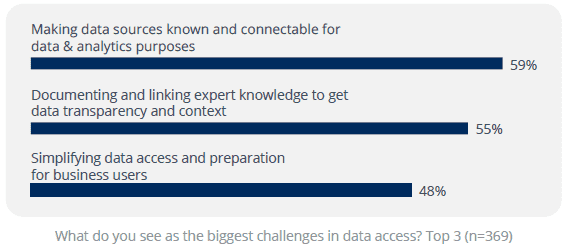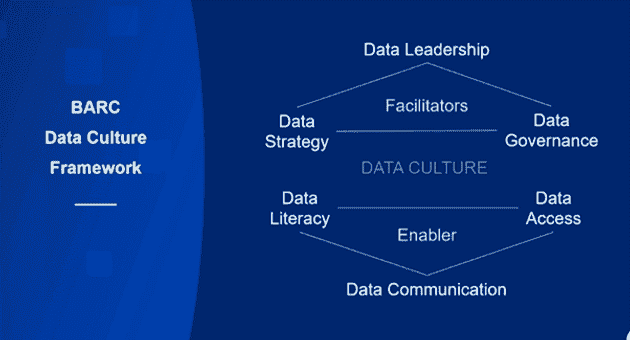BARC Survey: Easier Access to More Data Promotes a Better Data Culture
- BARC surveyed 384 people worldwide for its “Data Culture Survey 23”.
- The survey presents current trends in the building of a company data culture. This year, the focus was on the topic of data access, which 96% of survey participants agreed is the most relevant factor in the establishment of a data culture.
- The BARC Data Culture Framework provides concrete recommendations for data culture and data strategy.
BARC publishes the study Data Culture Survey 23, for which 384 people were surveyed on the current data culture in their companies. Respondents came from all over the world and represent a variety of different functions, industries and company sizes. Based on the results, the authors have derived trends in the establishment of a data culture and provide concrete recommendations for action.
The study shows companies understand that a data culture must be anchored in the data strategy if it is to have lasting success. The most frequently implemented data culture initiatives are “data strategy” (34%), “data governance” (33%) and “data access” (32%).
Data access is crucial
Respondents cited “data access” as the most important initiative to positively impact data culture. The biggest challenges to liberalizing data access are users’ lack of knowledge and enabling simple access methods. Many of the conditions for better data access must therefore be created first. More than half of all respondents would like to have greater transparency about company data and to be able to access it more easily (see Figure).

Gut feeling is still important when making decisions
The majority of respondents rely on a mix of data and gut feeling to make decisions (51%). The percentage of companies that tune out gut feelings and make mainly data-driven decisions has remained stable this year at around one third (32%). However, nearly half of the companies surveyed say improved decision-making is among the goals they have achieved. More than a third have achieved process improvements and cost reductions through the use of data. However, there is also a high expectation of benefits from data. Respondents hope to achieve further improvements in their decision-making and processes, revenue growth and ultimately competitive advantage through a better data culture.
Dr. Carsten Bange, Managing Director of BARC and co-author of the study, commented, “Data culture still eats data strategy for breakfast. Anchoring a sustainable data culture is vital if companies want to enforce their data strategy. For this to happen, there needs to be company-wide awareness of the benefits and advantages of data and analytics.”
BARC Data Culture Framework
To help companies understand the key starting points for establishing and improving a data culture, BARC has developed the Data Culture Framework (see Figure). The framework includes six action areas. There is no inherent hierarchy among them; different companies will have different starting points and priorities. However, data access and data governance are among the first topics most companies address.

About The Survey
“BARC Data Culture Survey 23 – How to Liberalize Data Access to Empower Data Users” is a new BARC study on the topic of establishing and maintaining a data culture. 384 people from different functions, industries and company sizes from all over the world were interviewed for the study. The authors are Dr. Carsten Bange, BARC Founder and CEO, and Timm Grosser, Senior Analyst for Data & Analytics. The study is available for free download here thanks to sponsorship by Denodo, Snowflake, Tableau and Zeenea. The accompanying infographic can be found here.
